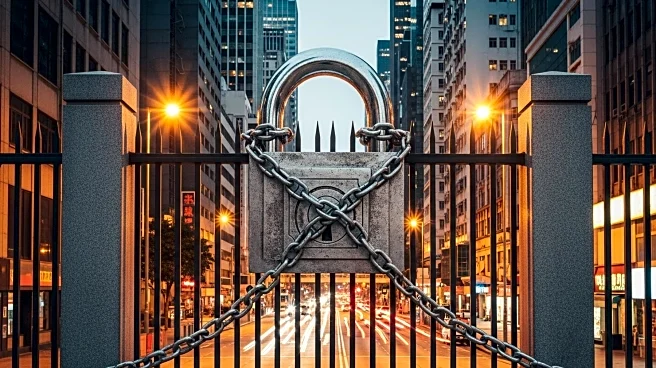What's Happening?
Chicago is preparing for increased immigration enforcement as President Trump has threatened to deploy federal troops to the city. Illinois Governor JB Pritzker and Chicago Mayor Brandon Johnson have publicly opposed these actions, criticizing Trump's social media posts that suggest a federal crackdown. The President's recent rebranding of the Pentagon as the 'Department of War' has further fueled tensions. Local officials are concerned about the surge of ICE agents, with estimates suggesting up to 300 agents could be deployed over the weekend. The enforcement is expected to be staged from the Great Lakes Naval Station, with fencing erected around the federal courthouse in anticipation. Community events, such as El Grito Chicago, have been postponed due to safety concerns related to ICE activity.
Why It's Important?
The escalation of federal immigration enforcement in Chicago highlights the ongoing conflict between local and federal authorities regarding immigration policy. Sanctuary cities like Chicago have been at the forefront of resisting federal immigration measures, arguing that such actions undermine community trust and safety. The deployment of federal troops and ICE agents could lead to increased tensions and protests, as seen with the recent demonstrations outside the Naval Station Great Lakes. The situation underscores the broader national debate on immigration enforcement and the balance of power between local and federal governments. The actions taken by President Trump could set a precedent for similar interventions in other cities, affecting local governance and community relations.
What's Next?
As federal enforcement ramps up, Chicago officials and community leaders are likely to continue their opposition, potentially seeking legal avenues to challenge the federal actions. The presence of ICE agents may lead to further protests and community unrest, requiring careful management by local authorities. The situation may also prompt discussions at the national level regarding the role of federal intervention in local matters, especially in sanctuary cities. The outcome of these enforcement actions could influence future immigration policies and the relationship between the Trump administration and local governments.
Beyond the Headlines
The deployment of federal troops and ICE agents in Chicago raises ethical and legal questions about the use of federal power in local jurisdictions. It challenges the principles of federalism and the autonomy of local governments to manage their own affairs. The situation also highlights the cultural and societal impacts of immigration enforcement, particularly in diverse urban areas. Long-term implications may include shifts in public policy and community dynamics, as well as potential changes in the political landscape as local leaders and residents respond to federal actions.









